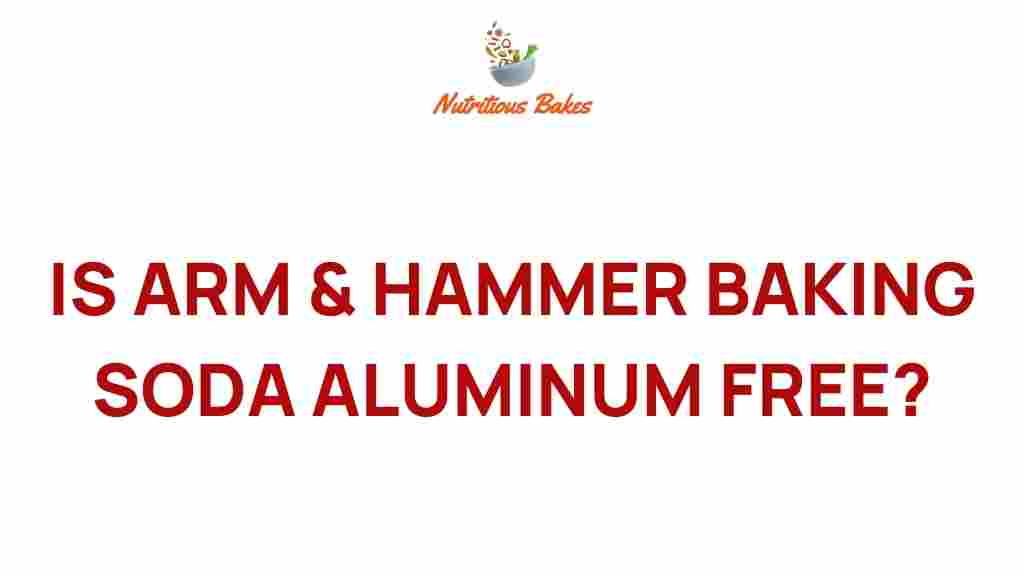Is Arm & Hammer Baking Soda Truly Aluminum-Free?
When it comes to household products, few items are as versatile and ubiquitous as baking soda. Among the many brands available, Arm & Hammer has become a household name, often associated with baking, cleaning, and even personal care. However, a common question that arises is: Is Arm & Hammer baking soda truly aluminum-free? In this article, we will uncover the truth about Arm & Hammer, delve into the health and safety aspects, and explore its many uses in cooking and household applications.
Understanding Baking Soda
Baking soda, scientifically known as sodium bicarbonate, is a naturally occurring mineral that has been used for centuries. It’s a powerful ingredient that serves multiple purposes, including:
- Cooking: Baking soda is a leavening agent, helping baked goods rise.
- Cleaning: It acts as a gentle abrasive and deodorizer.
- Health: Some people use it for various health remedies, including heartburn relief.
What Does Aluminum-Free Mean?
Before we determine whether Arm & Hammer baking soda is aluminum-free, it’s essential to understand what aluminum-free means. Some baking powders contain aluminum compounds, which can impart a metallic taste and may raise health concerns for certain individuals. Choosing aluminum-free products can be critical for those who are sensitive to aluminum or prefer to avoid it for dietary reasons.
Arm & Hammer Baking Soda Ingredients
According to the ingredient list provided by Arm & Hammer, the primary component of their baking soda is sodium bicarbonate. There are no additives, and importantly, no aluminum compounds are included in the formulation. Here’s a closer look at what you will find:
- Sodium Bicarbonate: The key ingredient that provides the leavening effect in baking.
- No Aluminum Compounds: Arm & Hammer baking soda is marketed as an aluminum-free product.
This makes it a popular choice for those who want to avoid aluminum in their cooking and baking.
The Health Implications of Aluminum in Food
Many consumers are concerned about the health implications of consuming aluminum. While the FDA considers aluminum in food to be safe in small amounts, some studies suggest that excessive exposure may be linked to health issues, including:
- Alzheimer’s Disease
- Bone disorders
- Kidney problems
Choosing aluminum-free products like Arm & Hammer baking soda can mitigate these concerns, making it a safer option for cooking and baking.
Using Arm & Hammer Baking Soda in Cooking
Now that we’ve established that Arm & Hammer baking soda is aluminum-free, let’s explore how to use it effectively in your cooking and baking. Here are some ways to incorporate this powerful ingredient into your kitchen:
1. Baking
When baking, baking soda helps your goods rise. Here’s a simple method to use it:
- Measure: Use the amount specified in your recipe. Typically, you’ll need about 1 teaspoon of baking soda for every cup of flour.
- Mix: Combine it with the dry ingredients before adding wet ingredients to ensure even distribution.
- Acidic Ingredient: Make sure to include an acidic ingredient (like vinegar or lemon juice) in your recipe to activate the baking soda and produce carbon dioxide bubbles.
2. Cooking
Baking soda can also be used in cooking, such as:
- Vegetable Tenderizer: A pinch of baking soda can make vegetables softer when cooking.
- Color Preservation: Adding a small amount can help preserve the color of green vegetables.
3. Cleaning Fruits and Vegetables
You can use baking soda to clean fruits and vegetables effectively. Here’s how:
- Mix: Create a solution of baking soda and water (1 teaspoon per cup of water).
- Soak: Soak your fruits and vegetables for a few minutes.
- Rinse: Rinse thoroughly with water to remove any residue.
Using Arm & Hammer Baking Soda for Household Purposes
Beyond cooking, Arm & Hammer baking soda is an excellent household product. Here are some ways to utilize it:
1. Odor Neutralizer
Baking soda is a natural deodorizer. Place an open box in your refrigerator or sprinkle it on carpets to eliminate odors. Follow these steps:
- Open Box: Keep an open box in your fridge to absorb odors.
- Carpets: Sprinkle on carpets, let it sit for 15-20 minutes, and then vacuum.
2. Cleaning Surfaces
Baking soda can be used to clean various surfaces. Here’s a simple cleaning paste recipe:
- Combine: Mix baking soda with water to form a paste.
- Apply: Apply to the surface you wish to clean.
- Scrub: Use a sponge or cloth to scrub away dirt and stains.
3. Laundry Booster
Add a half cup of baking soda to your laundry to enhance your detergent’s effectiveness. This helps remove odors and brighten whites.
Troubleshooting Tips for Using Baking Soda
While using baking soda can be straightforward, there are times when you might encounter issues. Here are some troubleshooting tips:
Problem: Baking Doesn’t Rise
If your baked goods aren’t rising as expected, consider the following:
- Check the expiration date of your baking soda. Old baking soda loses its potency.
- Ensure you are using an acidic ingredient to activate the baking soda.
Problem: Metallic Taste in Food
If you detect a metallic taste in your baked goods, it may be due to:
- Using too much baking soda.
- Not balancing it with sufficient acidic ingredients.
Conclusion
In conclusion, Arm & Hammer baking soda is indeed aluminum-free, making it a safe choice for both cooking and household uses. With its many applications, from baking to cleaning, this versatile ingredient can help simplify your life while promoting health and safety. Whether you’re looking to bake a delicious cake, clean your kitchen, or freshen your laundry, you can trust that Arm & Hammer provides a reliable, aluminum-free product.
For more information on baking and cooking tips, check out this helpful resource. And if you’re interested in the science behind baking soda, feel free to read more on this external site.
This article is in the category Ingredients and created by NutritiousBakes Team
